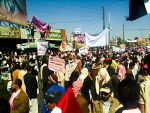Syrian Refugees: We Will Be Back, After Awhile
By Abdennour Toumi
Special correspondence from Şanliurfa, Turkey

Syrians have fled to Turkey in what was thought to be a quick escape seeking safety from a horrific war, leaving behind love ones, jobs and property.
When the Turkish government opened its borders to Syrian refugees, immediately extending assistance to them and offering temporary protection a few months later, the expectation was that the crisis in Syria would be resolved quickly and the Syrians would soon return home.

Semantically, the Syrians are not refugees, but guests of Turkey.
According to the 1951 Convention on the Status of Refugees, states are prohibited from forcing refugees back over borders into danger and must guarantee their right to work, shelter, travel and public assistance within their jurisdiction.
Turkey’s Disaster Management System, known as AFAD, was focussed mainly on the post-disaster period, and there was legislation to encourage risk re-eduction approaches before the damaging 1999 earthquake. In light of current events, the authorities agree that the country needs to develop a pre-disaster program and revise its legislation and administrative instructions.
In February, the flow of refugees out of Syria started up again with renewed vigor. The outbreak of increased military action in the zone around Aleppo, situated 45 kilometers from the border, urged people again to flee into Turkey. UNHCR estimates an increase of 20,000 new refugees in the Turkish cities of Hatay, Gaziantep and Urfa since the beginning of 2014. Twenty-two camps are in operation to welcome families where the daily influx even reached 2,000 on certain days, according to Ms. Melissa Fleming, chief spokeswoman for UNHCR.

Şanliurfa, a southeastern Turkish province neighboring northeastern Syrian provinces of Deïr e-Ezzor, e-Reqqa and el-Hassaka, has an overall population of nearly two million and is divided demographically between Arab and Kurdish inhabitants the majority of whom are Sunnis. Urfa, known as “The Prophet’s City,” is home to some 800,000 and now faces the influx of 180,000 Syrian refugees.
As the majority of the Syrian elite and the masses of the displaced are also Arab and Kurdish, they have concentrated in urban areas such as Urfa because of proximity to services provided by AFAD and a few international organizations (INGOs).
AFAD, in close coordination with the Turkish authorities, encourages the Syrians to register in order to obtain a Turkish ID card (kimlik). This official paper allows them access to full health care services and eventually primary education programs — in this instance, AFAD is working with UNICEF and Ministry of Education in running primary and middle schools.

As to education, the curriculum put by the Syrian National Coalition, apply the Syrian and Libyan education program is under the supervision of the Turkish Education Ministry, and the local administration — the pedagogical staff is exclusively Syrian. Nonetheless, private Syrian schools do exist. However, some of them offer religious programs which leave some Syrian families a bit skeptical about their agenda.
Families also face a serious problem involving the language barrier, because many Syrian students want to continue their academic program in Turkish universities.
Such universities require the TÖMER, generally equivalent to the American TOFFEL, and some of them offer a free one-year language program for the TÖMER exam.
For Syrians staying in the camps fully run by AFAD, there are well-equipped tents and container housing. There are also power lines, and at least as many streetlights, mosques, market, playgrounds, clinics, mobile schools run by AFAD, UNICEF provides the school supplies to the pupils. AFAD gives 80 Turkish lira a month (around $36 U.S.) per family household. For hygienic and sometimes security reasons, Syrian women prefer to be in container housing.
Those who are relatively better off move to the urban areas, also taking advantage of AFAD and community center services and activities in the town.

So at this level a Turkish NGO, IMPR Humanitarian, opened a community center in September, 2013, in an old section of the city. The decision was made by IMPR (International Middle East Peace Research) a think-tank based in Ankara.
This decision was made after an in-depth academic study and a constructive discussion with the local authorities and ethnic clans (el–A’achayer), according to IMPR Director.
IMPR Humanitarian is located in an Aleppo-style house in an older neighborhood. According to the Center’s Director and Project Manager, “the feeling of the place was important to us to give a sense of being at home for the Syrians.” The motto of the Center is “el-beït beïtouk” (the house is yours) and it provides psycho-social work services and activities, to the extent of language program and children activities to both Syrians and non-Syrians.
A psychologist at the Center, monitors for psycho-social stress disorders in minors and adults and for issues specific to children and women, such as child abuse and domestic violence.
Lately the Center sponsored a media workshop for Syrian journalists to train them in methods and techniques current in this era of social media. The organizer, is a Syrian journalist and a member of the Arab Journalists’ League.
IMPR dispatched 22 students from its faculty in Ankara to participate with social workers in organizing activities for children and distributing clothing and gifts to Syrian families in nearby Akçakale on the Syrian border.
I spoke with some students whose first-hand experience was an emotional one. As they said, they had heard and read about the Syrians in Turkey, but were unaware of the real-life situation of the refugees.

Syrians in urban areas are confronted on a daily basis with many challenges, employment and decent housing being the major concerns. Resolution of these problems will go far to restore their dignity and well-being. But the situation is complex because of their status under Turkish law which considers them guests, not refugees.
Urban refugees don’t always have the right to work, even though the majority of them are well educated. Even if they do, the language barrier is daunting and legal issues related to Turkish labor law compound the situation. Under these restrictions, only heavy labor or menial jobs are open to them.
Local human rights organizations and lawyers are trying to lobby in Ankara to obtain work permits for Syrians as an introduction to permanent residency. According to a UNHCR advisor, there is a legislative proposal on this issue that may pass in voting on April 11th.
Indeed Syrians also suffer from abuse by local landlords and employers who exploit their misery.
For example, a worker, male or female, can be fired at any time and the rate at which this occurs is derisory. For a woman, a day-long shift at a beauty salon or tailor shop could earn her only 10TL, or a cook working from 10 a.m. to midnight might only receive 8TL.
The INGOs and local humanitarian organizations are also closely following the issues of child labor and sex trafficking. I spoke with the local attorney of the Board, Mr. Ali Fuat Bucak, who told me his organization is in process of opening legal channels with local Syrian lawyers to advise and train them as such cases rise. However, a Syrian human rights activist expressed the view that liberal human rights in Turkey were generally ineffectual due to ideological suspicions vis-à-vis their counterparts the Syrians.

Some 700,000 Syrian refugees in Turkey live outside the camps. Those with means settle in apartments; the less fortunate camp in parks, empty lots and huts. The latter, if they go to a community center, can be referred to AFAD and immediately assigned to a camp.
In spite of these extremely difficult times they are experiencing, the Syrians are grateful to the Turkish authorities and people, and they feel a personal gratitude to Premier Erdoğan whom they call Si-e-Eteyab (Sir Tayeb). As one Syrian teacher told me, “Syrians have a doctor-president, he killed all his patients, whereas Turkey has a Premier Business Administration Manager; he took care of all his country’s long-time underdeveloped infrastructure.”
Subsequently, Turkey is building walls along small sections of its borders and near mines, and sometimes closes the border to those without passports pending security clearance. This happened recently when large numbers of Syrians fled intensive bombing in Aleppo and massacres committed by el-Qae’eda in Iraq and the Levant. Those without passports passed unimpeded around checkpoints in a steady stream guided by smugglers who, for 200 Turkish lira, would take a person across the border.
Initially refusing Syrian refugees entry might have been difficult given the already open border between the two countries, the gaps between checkpoints, and a war close enough to bring in stray fire. Despite these factors, Turkey decided to open its arms to its war-ravaged Syrian neighbors.
Yet the crisis in Syria has not only lasted far longer than anticipated but has escalated, bringing with it widespread destruction and displacement, and has added to the political impasse in the country which now has become a proxy war for international powers.
As the conflict intensifies along its 500-mile border with no end in sight, as the resources and the patience of the Turkish government and people are stretched thin, questions arise about the limits of Turkey’s ability to extend its hospitality.
By the end of 2013 the Turkish government had spent $2.5 billion on its Syrian guests, primarily in camps — a significant figure that has created resentment among Turks on the eve of an important electoral test that awaits the AKP on March 30th when municipal elections are held.
The majority of Syrians with whom I spoke have one thing on their minds, families looking for a better future for their children in Turkey, singles looking for an opportunity to cross into Europe (even to the U.S.). As for the question of “returning,” many have already made up their minds — returning is not an option; a better life lies elsewhere. Indeed, one Palestinian woman married to a Syrian compared the Syrian drama to the 1948 Palestinian Nekba.
Certainly a long road of struggle is still ahead for the Syrians in Turkey, but a drawing by a child at IMPR Humanitarian Center of a pretty woman and a yellow candle offered a ray of hope with the inscription in Arabic, sanarja’a oualou ba’ad heen (we will be back, after awhile).
Related articles


- The Israeli-Palestinian Conflict: Is the Neither-Peace-nor-Security As-sumption Dominating Again? - June 7, 2021
- Algeria: “I Can See Clearly Now” - August 5, 2019
- Majesty Mohammed VI and General Gaïd Salah Tear Down This Wall! - July 29, 2019























